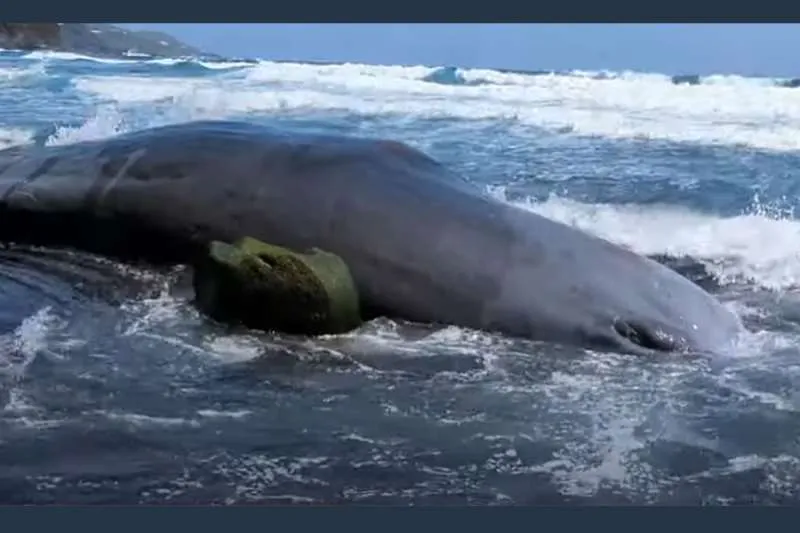A rare find in the belly of a beached sperm whale stirs excitement and raises questions about the perfume industry’s “floating gold
In an astonishing twist of fate, a routine inspection of a deceased sperm whale on Nogales Beach in the Canary Islands led to the discovery of a 21-pound lump of ambergris, a rare and highly prized substance with an estimated value of $544,000. Antonio Fernández, a professor at the University of Las Palmas, made the remarkable find during an examination of the whale’s intestines on May 21, capturing the attention of both the scientific community and the wider public.

Ambergris, often referred to as “floating gold” or the “treasure of the sea,” is a secretion produced in the digestive systems of sperm whales. Its scarcity and distinctive odor make it a sought-after ingredient in the perfume industry. Typically found in only one out of every 100 sperm whale specimens, the discovery of such a significant amount is a rare occurrence that adds to the mystique surrounding this peculiar substance.
According to reports from local news outlet Canarias7, Fernández stumbled upon the ambergris while investigating the cause of death of the beached sperm whale. The professor described the find, stating, “What I took out was a stone about 50 to 60 cm in diameter, weighing 9.5 kg.” He further explained that the whale had succumbed to sepsis caused by the presence of the chunk of ambergris in its system.
The revelation of this valuable discovery raises intriguing questions about the formation of ambergris. Scientists believe that sperm whales excrete the substance when they consume cephalopods, like squid and octopus, and are unable to digest the beaks of their prey. In some instances, these indigestible remnants mix with a waxy substance in the intestines, ultimately resulting in the creation of ambergris.
The scientific significance of this find is complemented by Fernández’s intention to donate the valuable lump to local authorities in La Palma. The plan is to sell the ambergris, with the proceeds aiding those affected by a devastating volcanic eruption in 2021. This altruistic gesture not only highlights the potential positive impact of scientific discoveries but also serves as a reminder of the interconnectedness between natural phenomena and human welfare.
This is not the first time that ambergris has made headlines for its significant monetary value. In 2021, a group of fishermen in the Gulf of Aden stumbled upon a chunk of ambergris worth approximately $1.5 million. Their windfall allowed them to purchase houses, cars, and boats, showcasing the economic potential of such rare finds. However, it’s worth noting that the commercial trade of ambergris is subject to strict regulations in various countries, with some, including Australia and the United States, banning its trade due to concerns about exploitative whaling practices.
As the news of this discovery circulates globally, it raises awareness about the ecological importance of protecting marine life and underscores the potential economic benefits hidden within the natural world. The tale of the ambergris found in the Canary Islands adds a new chapter to the ongoing exploration of the secrets held by the ocean’s depths, reminding us that even in death, whales can reveal treasures that capture the imagination of scientists and enthusiasts alike.
